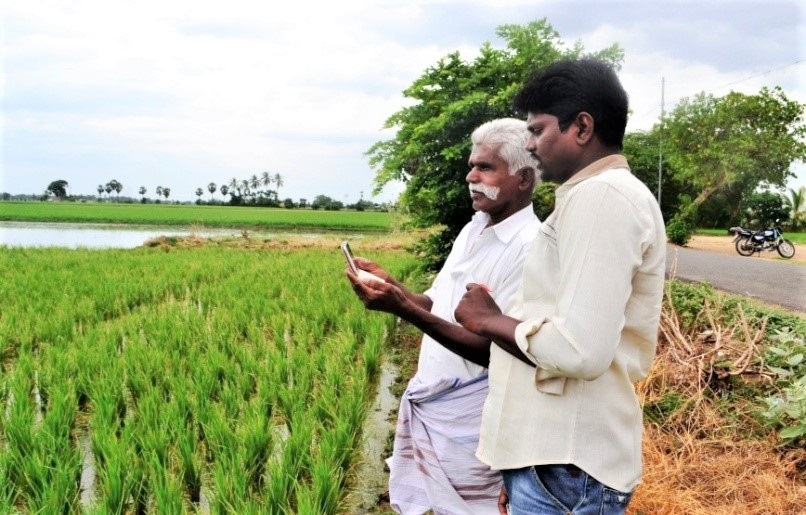
By Akanksha Nagpal & Arun Jadhav
Smallholder farmers in India are increasingly exposed to climate change and extreme weather events. Research on innovative strategies and tools to improve agricultural risk management is the need of the hour. ‘Seeing is believing’, as the phrase goes, underpins the innovative concept of the project entitled ‘Picture Based Insurance (PBI) bundled with Picture Based Advisories (PBA) for sustainable and scalable risk management services.’
Funded by the CGIAR Platform for Big Data in Agriculture Inspire Challenge, the International Food Policy Research Institute (IFPRI) and CABI conducted a pilot study around this concept in Haryana (a state in Northern India) for the wheat crop in Rabi (winter) 2017-18. By showing positive impacts and demonstrating the potential to scale this solution, IFPRI and CABI were selected in 2018 as the winner of the Inspire Challenge scaling award.
Phase 2 of the project leveraged CABI’s existing Plantwise programme (a global flagship programme led by CABI in 34 countries) which targets pest and disease identification and advisory on prevention and management practices. The programme organizes ‘plant clinics’ where trained ‘plant doctors’ analyse the cause of crop damage and provide personalized advisories to help farmers manage their production risks more effectively.
The Picture-Based Advisory (PBA) tool, developed during the 2017-18 study, helped plant doctors work with farmers remotely – thereby enabling an increase in the reach of the advisory service. The phase 2 in Season 1 (July to October 2019) reached 1000 paddy and groundnut growing farmers in 50 villages in Pudukottai, Thiruaiyaru and Villupuram district in Tamil Nadu.
Village sessions were conducted to build awareness on the concept of PBA among the farmers. The UzhavarCam App was installed in the smart phones of farmers for registration of respective sites. The farmers take overview images, which consists of the initial picture and repeat pictures, while close up images are linked to damage and advisories. Field volunteers were assigned to monitor, motivate and ensure that the registered farmers send the images at weekly intervals.

In season 2 (November 2019 to March 2020) we worked closely with 500 farmers (250 each for paddy and groundnut). Remote advisories, according to the problems reflected from the close-up images, received from the farmers were given after proper diagnosis and confirmation by the plant doctors. This not only reduces the risk of crop failure but also improves the sustainability of insurance.
The farmers expressed their appreciation for advisory support received through the services of PBA. Earlier, in case of occurrence of any pests and diseases in the field, the farmers were mostly dependent on advisories from agro-input dealers who are not trained to diagnose the problems and their recommendations were based on market incentive – which in most cases did not solve the problem. It rather resulted in higher cost and unnecessary spraying.
Anandan, a 31-year-old farmer enrolled with the project, said, “We never had an opportunity to learn the actual cause of the crop issues and had to travel to Kunandarkovil (17 km away) or Pudukkottai (20 Km away) to get the inputs and spend approximately Rs 200 towards conveyance cost.”
He expressed that in the past he attended the plant clinic sessions and received practical advisories but, in some instances, the infected plant sample dried while taking to the plant clinic, which made it difficult to explain the pest/disease as it was not clearly visible. On the contrary, Anandan, using PBA, captured the pest /disease problem live on the onset of first symptoms and could share it to the portal for timely advise from experts.

Ms Kanakavalli, a 38-year-old woman farmer said, “The project empowered the farmers to take a systematic pathway, initially educating them on diagnosing and confirming the problem, thus building confidence in them to address the situation in time.”
She also shared that the methodology was simple, cost effective and user-friendly to adopt. She also obtained reasonable yield after adopting the management practices recommended by the experts. Another beneficiary, Mr Radha expressed that through the use of this modern technology efficiently we ‘gain more and lose less.’ Due to PBA technology, they now have clear idea about the problem and adopt precise recommendations.

The project is now entering its third phase in partnership with the M S Swaminathan Research Foundation (MSSRF), wherein the concept of PBA bundled with PBI would be tested in Pudukkottai and Thiruvaiyaru districts of Tamil Nadu. This comprises of 70 villages and targets 350 farmers for two crops – Paddy & Groundnut from July to December 2020.
Farmers can give the service providers ‘eyes on the ground’ by sharing pictures of their damaged crops and thereby augment the information available with insurance providers. This in turn will result in allowing them to provide improved financial services at a lower cost with better insurance pay outs to farmers at low costs.
Additional information
Find out more about ‘Seeing is Believing – empowering farmers with smartphone imaging’ from the project page.
More details on the Picture-based Crop Insurance can be found on the IFPRI website.
The M.S. Swaminathan Research Foundation has published a case study from Tamil Nadu which you can read here.
Related News & Blogs
The persistent threat of emerging plant disease pandemics to global food security
Global plant disease outbreaks are increasing, threatening the food security of vulnerable people in many parts of the world, writes Wayne Coles, PR Manager, CABI. A nutritious and stable food supply can help lift them out of poverty and improve…
8 June 2021




